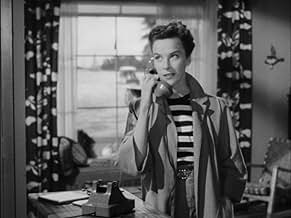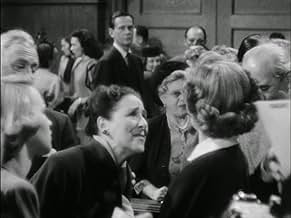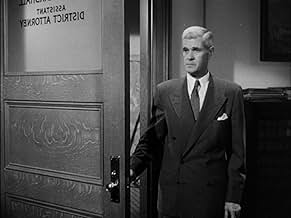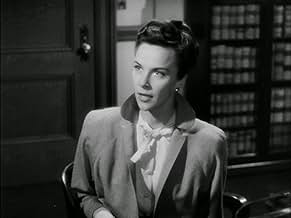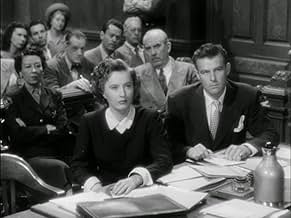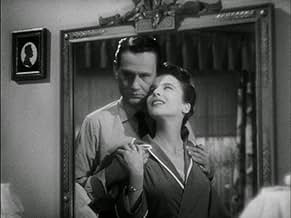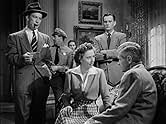IMDb RATING
6.9/10
3.4K
YOUR RATING
Assistant district attorney Cleve Marshall falls for the mysterious Thelma Jordon when she seeks help solving robberies of her aunt's estate.Assistant district attorney Cleve Marshall falls for the mysterious Thelma Jordon when she seeks help solving robberies of her aunt's estate.Assistant district attorney Cleve Marshall falls for the mysterious Thelma Jordon when she seeks help solving robberies of her aunt's estate.
Kasey Rogers
- Dolly
- (as Laura Elliot)
Gertrude Hoffman
- Aunt Vera Edwards
- (as Gertrude W. Hoffman)
Kate Drain Lawson
- Clara
- (as Kate Lawson)
- Director
- Writers
- All cast & crew
- Production, box office & more at IMDbPro
Featured reviews
The Assistant District Attorney Cleve Marshall (Wendell Corey) has an unhappy marriage with his wife Pamela Blackwell Marshall (Joan Tetzel) due to the interference of her father, Judge Calvin H. Blackwell (Minor Watson). He decides to drink in his office after hours instead of going to the birthday party of Pamela. Out of the blue, a woman named Thelma Jordon (Barbara Stanwyck) arrives at the office looking for Cleve's boss to report an attempt of robbery of her wealthy Aunt Vera Edwards (Gertrude W. Hoffman) and she ends the night drinking and dancing with Cleve in a restaurant. Soon they have a love affair and Cleve falls in love with Thelma. But he does not know anything about the past of the mysterious Thelma. When Aunt Vera is murdered at home, Thelma calls Cleve to help her since she would be the prime suspect of shooting her aunt. He covers up the evidences that might link Thelma to the death becoming her accomplice and is assigned to be the prosecutor of her judgment. What will happen to Thelma and Cleve?
"The File on Thelma Jordon" is a fine film-noir directed by the master Robert Siodmak. Barbara Stanwyck performs the typical femme fatale, seducing the assistant DA Cleve Marshall and destroying his life. The moralist conclusion could have been better but the film is worthwhile watching. My vote is eight.
Title (Brazil): "A Confissão de Thelma" ("The Confession of Thelma Jordon")
"The File on Thelma Jordon" is a fine film-noir directed by the master Robert Siodmak. Barbara Stanwyck performs the typical femme fatale, seducing the assistant DA Cleve Marshall and destroying his life. The moralist conclusion could have been better but the film is worthwhile watching. My vote is eight.
Title (Brazil): "A Confissão de Thelma" ("The Confession of Thelma Jordon")
The File on Thelma Jordon is directed by Robert Siodmak and written by Ketti Frings and Marty Holland. It stars Barbara Stanwyck, Wendell Corey, Paul Kelly, Joan Tetzel, Stanley Ridges and Richard Rober. Music is by Victor Young and cinematography by George Barnes.
Assistant district attorney Cleve Marshall (Corey) falls for Thelma Jordon (Stanwyck) after she seeks help solving a problem with prowlers and burglars. But is there more to Thelma than meets the eye?
Probably due to availability issues in home viewing formats, this appears to be one of film noir legends Siodmak and Stanwyck's under seen pictures. Which is a shame, for although it is often tagged as something of a lesser value Double Indemnity, it's a noir that noir lovers can get great rewards from.
As we are in noirville the plot isn't at all surprising. Stanwyck fronts up for what we expect is femme fatale duty, Corey looks to be on course for being a hapless loser dude, Kelly is up for some tough copper portrayal, while Rober stalks the edges of the frame as bad news bloke. A despicable crime is at the core of the story, and characterisations are straight out of the dark alleyway (Thelma has murky secrets and ideals, Wendell is unhappily married with a drink problem). Running at 100 minutes in length, the pic does feel a touch too long, especially given that the first thirty minutes is focused on building the principal players, where they are at in their life and the build up of their relationship. This asks for faith in staying with the piece, in hope it rewards for the following hour plus. Thankfully it does.
As the crime arrives, we are treated to noir nirvana as per style of film making. It's the middle of the night in a house menaced by shadows as the wind bashes an open window shutter. For a good twenty minutes, prior to - during - and post the crime, the house is a scary monstrous place, perfect for a dark deed to be enacted. The great Siodmak (The Killers, The Spiral Staircase, Criss Cross) is in his element on this, where aided by the superb photographic skills of Barnes (Rebecca, Force of Evil), the staging of scenes and the visuals enhance the moody machinations of the plot. As does Young's dramatic musical score. So with acting performances comfortably on par for the good, the tech credits are high.
Irks come with that drawn out first third of film, and the ending poses some question marks as well. Personally I would have liked it to have finished five minutes earlier, but as it stands there's a sort of double whammy with the finale. Some will find it contrived, others will applaud the ultimate outcome since it doesn't cop out. Either way, this is a noir film worthy of seeking out for the like minded purveyors of such things. 7/10
Assistant district attorney Cleve Marshall (Corey) falls for Thelma Jordon (Stanwyck) after she seeks help solving a problem with prowlers and burglars. But is there more to Thelma than meets the eye?
Probably due to availability issues in home viewing formats, this appears to be one of film noir legends Siodmak and Stanwyck's under seen pictures. Which is a shame, for although it is often tagged as something of a lesser value Double Indemnity, it's a noir that noir lovers can get great rewards from.
As we are in noirville the plot isn't at all surprising. Stanwyck fronts up for what we expect is femme fatale duty, Corey looks to be on course for being a hapless loser dude, Kelly is up for some tough copper portrayal, while Rober stalks the edges of the frame as bad news bloke. A despicable crime is at the core of the story, and characterisations are straight out of the dark alleyway (Thelma has murky secrets and ideals, Wendell is unhappily married with a drink problem). Running at 100 minutes in length, the pic does feel a touch too long, especially given that the first thirty minutes is focused on building the principal players, where they are at in their life and the build up of their relationship. This asks for faith in staying with the piece, in hope it rewards for the following hour plus. Thankfully it does.
As the crime arrives, we are treated to noir nirvana as per style of film making. It's the middle of the night in a house menaced by shadows as the wind bashes an open window shutter. For a good twenty minutes, prior to - during - and post the crime, the house is a scary monstrous place, perfect for a dark deed to be enacted. The great Siodmak (The Killers, The Spiral Staircase, Criss Cross) is in his element on this, where aided by the superb photographic skills of Barnes (Rebecca, Force of Evil), the staging of scenes and the visuals enhance the moody machinations of the plot. As does Young's dramatic musical score. So with acting performances comfortably on par for the good, the tech credits are high.
Irks come with that drawn out first third of film, and the ending poses some question marks as well. Personally I would have liked it to have finished five minutes earlier, but as it stands there's a sort of double whammy with the finale. Some will find it contrived, others will applaud the ultimate outcome since it doesn't cop out. Either way, this is a noir film worthy of seeking out for the like minded purveyors of such things. 7/10
So much has already been said about this film, so I don't have to elaborate. All I can say about this movie is "oh my!". The reason being is that during the late 40's and early 50's a film about infidelity, even though popular at the time (Nora Prentiss, The Postman Always Rings Twice) was viewed by many as taboo, but that didn't stop them from flocking to the local theater to see it!
What puzzles me is that this film has been ignored. It is a well crafted movie with all the elements of a good film noir. It has crime, it has sex, it has deception and it has corruption throughout and it has great cinematography; what a perfect noir! If you have a chance to see this film on TCM, do yourself a favor and make a copy. You will not be disappointed.
What puzzles me is that this film has been ignored. It is a well crafted movie with all the elements of a good film noir. It has crime, it has sex, it has deception and it has corruption throughout and it has great cinematography; what a perfect noir! If you have a chance to see this film on TCM, do yourself a favor and make a copy. You will not be disappointed.
There have frequently been two main reasons for seeing any film etc. One is the cast, so many films have a cast full of very talented actors that promises already so much. The other is if the story/premise itself sounds very interesting on paper. 'The File on Thelma Jordan' is another one of many examples to have both those things. Am also a great admirer of Barbara Stanwyck, and saw it also to see as many of her films not yet seen as possible.
On the most part, 'The File on Thelma Jordan' is pretty impressive with a lot of great things going for it. If it had a better male lead and had a tighter pace to begin with, there was a lot of potential for it to be great. It just falls short of that but the good things are many and those good things are actually excellent. It really helps that we have such a great actress excelling in a role that plays to her considerable strengths and that we have a director that was experienced in this type of film.
Am going to start with those good things. First and foremost, Stanwyck. She is absolutely marvellous here, she has a real allure and at times vulnerability but is also very steely and evokes chills. The supporting cast play their parts very well, even if none are quite on the same level as Stanwyck. Stanley Ridges especially comes over well. As does Robert Siodmak (who has done quite a lot of good films, especially 1946's 'The Killers'), showing a lot of flair and eye for detail and atmosphere.
Visually, 'The File on Thelma Jordan' looks great. The photography is both gorgeous and atmosphere-filled. The lighting is suitably moody and the production design is suitably elaborate. Victor Young's score looms ominously in all the right places. The script is sharp and thought probing and the story has suspense and surprising grit. It is also not hard to follow without being simplistic.
Wendell Corey was less good though in my view. Found him a bit too meek and anaemic in a role that too often goes overboard on the passiveness. He has a little more chemistry with Stanwyck than what was seen in 'The Furies', but it doesn't quite fire enough on all cylinders. It's competent but under-explored.
Pace wise, it could have been tighter in the early stages and takes too long to get going. While the ending is a surprise, it could have been handled with more subtlety.
Overall though, it is worth watching. 7/10
On the most part, 'The File on Thelma Jordan' is pretty impressive with a lot of great things going for it. If it had a better male lead and had a tighter pace to begin with, there was a lot of potential for it to be great. It just falls short of that but the good things are many and those good things are actually excellent. It really helps that we have such a great actress excelling in a role that plays to her considerable strengths and that we have a director that was experienced in this type of film.
Am going to start with those good things. First and foremost, Stanwyck. She is absolutely marvellous here, she has a real allure and at times vulnerability but is also very steely and evokes chills. The supporting cast play their parts very well, even if none are quite on the same level as Stanwyck. Stanley Ridges especially comes over well. As does Robert Siodmak (who has done quite a lot of good films, especially 1946's 'The Killers'), showing a lot of flair and eye for detail and atmosphere.
Visually, 'The File on Thelma Jordan' looks great. The photography is both gorgeous and atmosphere-filled. The lighting is suitably moody and the production design is suitably elaborate. Victor Young's score looms ominously in all the right places. The script is sharp and thought probing and the story has suspense and surprising grit. It is also not hard to follow without being simplistic.
Wendell Corey was less good though in my view. Found him a bit too meek and anaemic in a role that too often goes overboard on the passiveness. He has a little more chemistry with Stanwyck than what was seen in 'The Furies', but it doesn't quite fire enough on all cylinders. It's competent but under-explored.
Pace wise, it could have been tighter in the early stages and takes too long to get going. While the ending is a surprise, it could have been handled with more subtlety.
Overall though, it is worth watching. 7/10
One of the noir cycle's best titles ushers in one of its better offerings. Barbara Stanwyck's assumption of the title role, of course, gives the picture a running start. She had worked with Billy Wilder and helped to shape the cycle in Double Indemnity, and was to work with Fritz Lang in Clash by Night and even Anthony Mann in The Furies (a western, yes, but a dark one), all key noir craftsmen. Here her director is the no less central Robert Siodmak, and her performances in this and the other titles cited (plus The Strange Love of Martha Ivers and at least five other suspense films of the 1940s and 1950s) cement her sobriquet as the First Lady of Film Noir.
Like her Martha Ivers, Stanwyck's Thelma Jordon has a wealthy old aunt (Gertrude Hoffman, who the next year in Caged would steal that movie from some very tough competition). One evening the niece strolls into the District Attorney's office with a story about prowlers and burglars (explaining that she bypassed the police because `My aunt is eccentric, and uniforms upset her'). She tells her tale to an inebriated assistant D.A., Wendell Corey, who's drinking to escape his embittered marriage. Stanwyck lends a sympathetic ear, and they start seeing one another on the sly.
When the aunt, inevitably, is found shot, Stanwyck calls not the police but Corey, and in a tense and extended scene of panic, he helps her cover up evidence that may incriminate her. When she emerges as the prime suspect, he also arranges for his boss to be disqualified, so he can sabotage the prosecution. Stanwyck (after a beautifully orchestrated processional from jail to courthouse) is acquitted. But her past has begun to catch up with her, complete with a shady lover who keeps turning up and who shoves the compromised Corey out of the picture. But never trust a duplicitous woman, particularly if she's within easy reach of a dashboard cigarette lighter....
Siodmak (with Ketti Frings, who wrote the screenplay) starts the movie so slowly that it looks like it's going to shape up into a routine, adulterous triangle. But he's just laying his groundwork. He keeps Stanwyck behind ambiguous veils, too, stripping them off one by one. Corey proves just right as the dupe, the fall guy (as Fred MacMurray proved right in Double Indemnity); a skillful character actor who always submerged his own personality in the roles he played, he tended to look a little pallid in leading-man roles he took next to the female stars against whom he was pitted.
Siodmak may be the most ruminative of the great noir auteurs he eschews flash for solid, patient construction. But when it's time for the big set-pieces (the nocturnal panic in the dark old mansion, the perp walk, the shocking flourish of violence at the end courtesy of Stanwyck and that cigarette lighter), he does them full justice. The File on Thelma Jordon falls just short of the summa-cum-laude distinction of his The Killers, and maybe of Criss Cross and even Christmas Holiday, too. But with Stanwyck's drawing upon the full fetch of her talents, it's an indispensable moment in the noir cycle.
Like her Martha Ivers, Stanwyck's Thelma Jordon has a wealthy old aunt (Gertrude Hoffman, who the next year in Caged would steal that movie from some very tough competition). One evening the niece strolls into the District Attorney's office with a story about prowlers and burglars (explaining that she bypassed the police because `My aunt is eccentric, and uniforms upset her'). She tells her tale to an inebriated assistant D.A., Wendell Corey, who's drinking to escape his embittered marriage. Stanwyck lends a sympathetic ear, and they start seeing one another on the sly.
When the aunt, inevitably, is found shot, Stanwyck calls not the police but Corey, and in a tense and extended scene of panic, he helps her cover up evidence that may incriminate her. When she emerges as the prime suspect, he also arranges for his boss to be disqualified, so he can sabotage the prosecution. Stanwyck (after a beautifully orchestrated processional from jail to courthouse) is acquitted. But her past has begun to catch up with her, complete with a shady lover who keeps turning up and who shoves the compromised Corey out of the picture. But never trust a duplicitous woman, particularly if she's within easy reach of a dashboard cigarette lighter....
Siodmak (with Ketti Frings, who wrote the screenplay) starts the movie so slowly that it looks like it's going to shape up into a routine, adulterous triangle. But he's just laying his groundwork. He keeps Stanwyck behind ambiguous veils, too, stripping them off one by one. Corey proves just right as the dupe, the fall guy (as Fred MacMurray proved right in Double Indemnity); a skillful character actor who always submerged his own personality in the roles he played, he tended to look a little pallid in leading-man roles he took next to the female stars against whom he was pitted.
Siodmak may be the most ruminative of the great noir auteurs he eschews flash for solid, patient construction. But when it's time for the big set-pieces (the nocturnal panic in the dark old mansion, the perp walk, the shocking flourish of violence at the end courtesy of Stanwyck and that cigarette lighter), he does them full justice. The File on Thelma Jordon falls just short of the summa-cum-laude distinction of his The Killers, and maybe of Criss Cross and even Christmas Holiday, too. But with Stanwyck's drawing upon the full fetch of her talents, it's an indispensable moment in the noir cycle.
Did you know
- TriviaThe actors portraying Wendell Corey's character's children are Corey's real life children, Jonathan Corey and Robin Corey.
- GoofsCleve Marshall sits down at the desk opposite Miles Scott and says, "Can't talk till I have another drink." Scott picks up the whiskey bottle and pulls out the cork before handing it to Marshall. Marshall picks up the bottle and again pulls out the cork.
- Quotes
Thelma Jordon: I'm no good for any man for any longer than a kiss!
- Alternate versionsThis film was published in Italy in an DVD anthology entitled "L'uomo con il mantello", distributed by DNA Srl. The film has been re-edited with the contribution of the film history scholar Riccardo Cusin. This version is also available in streaming on some platforms.
- ConnectionsFeatured in The Silver Screen: Color Me Lavender (1997)
- How long is The File on Thelma Jordon?Powered by Alexa
Details
Box office
- Gross worldwide
- $63
- Runtime
- 1h 40m(100 min)
- Color
- Aspect ratio
- 1.33 : 1
Contribute to this page
Suggest an edit or add missing content


